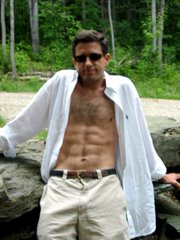Energy fears looming, new survivalists prepare
BUSKIRK, N.Y. (AP) — A few years ago, Kathleen Breault was just another suburban grandma, driving countless hours every week, stopping for lunch at McDonald's, buying clothes at the mall, watching TV in the evenings.
That was before Breault heard an author talk about the bleak future of the world's oil supply. Now, she's preparing for the world as we know it to disappear.
Breault cut her driving time in half. She switched to a diet of locally grown foods near her upstate New York home and lost 70 pounds. She sliced up her credit cards, banished her television and swore off plane travel. She began relying on a wood-burning stove.
"I was panic-stricken," the 50-year-old recalled, her voice shaking. "Devastated. Depressed. Afraid. Vulnerable. Weak. Alone. Just terrible."
Convinced the planet's oil supply is dwindling and the world's economies are heading for a crash, some people around the country are moving onto homesteads, learning to live off their land, conserving fuel and, in some cases, stocking up on guns they expect to use to defend themselves and their supplies from desperate crowds of people who didn't prepare.
The exact number of people taking such steps is impossible to determine, but anecdotal evidence suggests that the movement has been gaining momentum in the last few years.
These energy survivalists are not leading some sort of green revolution meant to save the planet. Many of them believe it is too late for that, seeing signs in soaring fuel and food prices and a faltering U.S. economy, and are largely focused on saving themselves.
And if you want to grow more of your own food, you must be a "localvore."
Growing the zero-mile diet
With fears of GMOs and widespread carbon guilt, cultivating your own veggies is poised to be the new competitive sport
VANCOUVER -- So you've bought into the 100-mile diet. Eco points to you. If you're looking for serious ethical kudos this season, however, you're going to have to dig even deeper - literally.
Serious locavores are working on a zero-mile diet, courtesy of the old-fashioned vegetable garden. As Canadians break ground in many parts of the country this month, concern over the carbon footprint of the global food trade is inspiring them to reach for their spades. And the hunger for a diet free of genetic modifications means the demand for organically grown and heirloom varieties has never been so great.
Dan Jason should know. The owner of Salt Spring Seeds has been promoting an intense local diet for 20 years from his home on British Columbia's Salt Spring Island. After he was interviewed by Vancouverites Alisa Smith and J.B. MacKinnon for their groundbreaking book, The 100-Mile Diet, Mr. Jason was struck with an idea.
"I thought, 'What is this 100-mile diet? We should be aiming for a zero-mile diet.' "
I'm just saying: Whatever happened to people? Yeesh.












No comments:
Post a Comment